
Vladimir Putin’s 17 years in power: the scorecard
Mr. Putin can’t seem to get a break in the western
media. I watched his recent interview with CBS’s Megyn Kelly with her tiresome,
boring questions like, “did Russia interfere in our election,” “did your
ambassador meet with Trump’s election officials,” “isn’t it true that
you’re a corrupt murderous thug,” etc. Only in response to Kelly’s
last question did Mr. Putin get to name a handful of his achievements in
Russia. But someone ought to better prepare his talking points on this score.
The below excerpt from my upcoming book summarizes how Russia has changed
during the 17 years since Mr. Putin has been at helm.
Beware of the false prophets, who come to you in
sheep’s clothing, but inwardly are ravenous wolves. You will know them
by their fruits. Grapes are not gathered from thorn bushes nor figs
from thistles, are they? So every good tree bears good fruit, but the bad tree
bears bad fruit
Matthew 7:16
On 26th July 2014 British magazine
“The Economist” published an article titled “A web of lies,” opening with the
following two sentences: “In 1991, when Soviet Communism collapsed, it
seemed as if the Russian people might at last have the chance to become
citizens of a normal Western democracy. Vladimir Putin’s disastrous
contribution to Russia’s history has been to set his country on a different
path.” Well, we have already seen how Russia fared in the 1990s after
Soviet communism collapsed. For some reason, the bright minds at The Economist
thought this path was so promising, it was a real shame – a disaster, no less –
that Vladimir Putin took Russia on a different one. Let’s take a closer look,
shall we, at Mr. Putin’s “disastrous contribution.”
To start with, Putin played the pivotal role in
keeping the country from disintegrating. When he came to power, Russia’s
regional governors were writing their own laws, disregarded presidential
instructions and were not even returning their republics’ tax receipts to the
Federation’s purse. Mikhail Gorbachev stated that Putin “saved Russia from
the beginning of a collapse. A lot of the regions did not recognize our
constitution.” [1] But this historical feat was only
the starting point of the subsequent renaissance of the nation. Its economy
returned to growth and became more vibrant and diverse than it had been perhaps
since the reforms of Pyotr Stolypin of the early 1900s.
Economic reforms
In 2000, Russia was one of the most corrupt countries
in the world. Without instituting draconian purges Putin took on the oligarchs
and steadily curtailed their power, gradually returning Russia to the rule of
law. By 2016 his government reduced corruption to
about the same level as that of the United States. That was the empirical
result of the annual study on corruption published in 2016 by Ernst & Young.[2] The global auditing consultancy
asked respondents around the world whether in their experience, corruption is
widespread in the business sector. Their survey, which was conducted in 2014,
indicated that only 34% of their Russian respondents thought so, the same
proportion as in the United States, and below the world average of 39%. Things
have probably improved further since then as Vladimir Putin stepped up a
high-profile anti-corruption campaign that led to investigations and
prosecution of a number of high level politicians around Russia. Even highly
ranked members of Putin’s own political party were not spared.[3] The unmistakable message of such
campaigns was that corruption would not be tolerated and that it would be
aggressively investigated and prosecuted. Some of the best evidence that
Putin’s various anti-corruption measures have had effect can be found in World
Bank’s Enterprise Surveys which ask businessmen the question, “was a gift or
informal payment expected or requested during a meeting with tax officials?”
In 2005, nearly 60% of respondents answered affirmatively. By 2009 this number
was 17.4% and by 2012 it had dropped to only 7.3%.
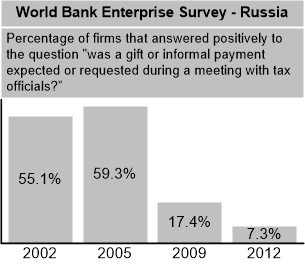
Putin’s government also made impressive advances in
making it easier for entrepreneurs and small businesses to set up shop, raise
capital and operate in Russia. According to World Bank’s annual “Doing
Business” report, which ranks 190 world economies on a set of attributes such
as the ease of starting a business, obtaining construction permits, obtaining
electricity, raising credit, and enforcing contracts. On all the metrics
combined, Russia managed to climb from 124th place in the world
in 2012 to 40th in 2017.[4]Thus, within only five years, Russia had
vaulted an impressive 84 positions in World Bank’s ranking. This was not a
random achievement but the result of President Putin’s explicit 2012 directive
that by 2018 Russia should be among the top 20 nations in the world for ease of
doing business.
One of the strategically important sectors where
Russia has made striking progress is its agricultural industry. After the
disastrous 1990s when she found herself dependent on food imports, Russia again
became self-sufficient in food production and a net food exporter. By 2014,
Russian exports of agricultural products reached nearly $20 billion, almost a
full third of her revenues from oil and gas exports. Not only is Russia now
producing abundant food for its own needs, the government is explicitly
favoring production of healthy foods, a strategy which includes a ban on the
cultivation of genetically modified (GMO) crops, introduced by the State Duma
in February of 2014. According to official Russian statistics, the share of GMO
foods sold in Russia declined from 12% in 2004 to just 0.1% by 2014.
These and many other constructive reforms have had a
very substantial impact on Russia’s economic aggregates as the following
examples show:
- Between 1999 and
2013, Russia’s gross domestic product (GDP) leaped nearly 12-fold from
$1,330 per capita to more than $15,560 in 2013, outpacing even China’s
remarkable economic growth.
- Russia reduced its
debt as a percentage of GDP by over 90%, from 144% in 1998 to less than
14% in 2015!
- Gross national
income per capita rose from $1,710 in 2000 to $14,810 in 2013.
- Unemployment fell
from 13% in 1999 to below 5% in 2014. Among the working population (those
aged 15-64), 69% have a paid job (74% of men).
- Only 0.2% of
Russians work very long hours, compared to 13% OECD average
- Poverty rate fell
from 40% in the 1990s to 12.5% in 2013 – better than U.S. or German
poverty rates (15.6% and 15.7%, respectively)
- Average monthly
income rose from around 1,500 rubles in 1999 to nearly 30,000 rubles in
2013.
- Average monthly
pensions rose from less than 500 rubles to 10,000 rubles.
Social and demographic improvements
Putin’s economic reforms included also a more
equitable distribution of wealth. As hopelessness faded and standard of living
improved, Russian society started to heal: suicides, homicides, and alcohol
poisonings declined dramatically. Over the twenty-year period between 1994 and
2014, suicides declined by 56%, homicide rate by 73%, and alcohol poisonings by
83%!

The chart below shows the evolution of these
improvements over time:
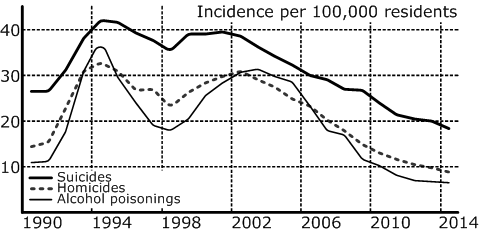
As we can see, these misery statistics rapidly
deteriorated with the introduction of shock therapy in 1992, but the trend
sharply reversed soon after Putin took charge. By 2014, these figures reached
their lowest values since even before 1992. Along with these improvements, the
nation’s demographic trends also experienced a dramatic turnaround. Russian
life expectancy, which sunk to an average of barely 64 years (57 for men), rose
steadily from the early 2000s to reach almost 72 in 2016, the highest it has
ever been in Russia’s history.
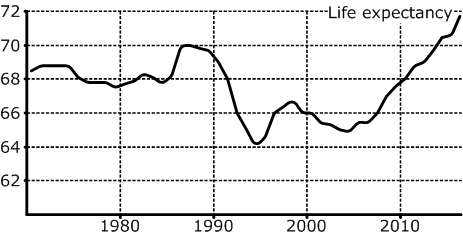
Looking at the way life expectancy in Russia changed
over time, we see again that it had collapsed in the early 1990s but the trend
turned around sharply under Vladimir Putin’s leadership of the country.
Similarly fertility rate, which dropped to 1.16 babies per woman in 1999,
increased by almost 50% to 1.7 babies by 2012, comparing favorably to European
Union’s average of 1.55 babies per woman of childbearing age. Abortions
declined 88% from a harrowing 250% of live births in 1993 to 31% in 2013.

Not only are Russians living longer than ever before
and enjoying much better quality of life, they also feel freer and
happier. In 2014, Gallup Analytics reported that 65% of Russians, more
than ever before, answered “Yes” when asked, “are you satisfied … with your
freedom to choose what you do with your life?” Meanwhile, Russia’s
happiness index rose more than tenfold, from 6 in 1992 to 70 in 2015. Happiness
index, compiled by VCIOM[5] adds the proportion of the
respondents reporting that they feel decidedly happy or generally happy and
deducts those that report feeling generally unhappy or decidedly unhappy.
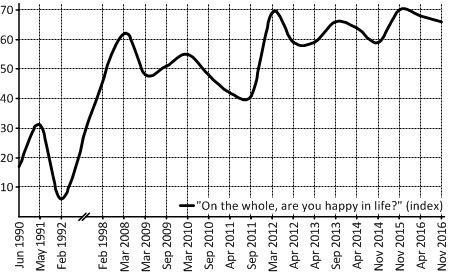
The next chart further corroborates the idea that
under Putin’s leadership, Russia has been developing as a sane and prosperous
society, not only for the benefit of a narrow ruling class and at everyone
else’s expense, but for the vast majority of ordinary Russians.

By 2014, the great majority of Russians felt satisfied
with their lives and believed that things in Russia were moving in the right
direction. These figures only tapered off after the 2014 western-sponsored coup
in Ukraine and the subsequent economic sanctions imposed on Russia. At the same
time, the price of oil – still one of Russia’s largest export – collapsed from
over $100 per barrel to under $40. Economic sanctions and the oil price
collapse triggered a significant crisis in Russia’s economy. However, in spite
of the continuing sanctions regime imposed on the country, its economy started
improving again in 2016, thanks to its diverse industrial base that includes a
developed commercial and consumer automotive industry, advanced aircraft and
helicopter construction based largely on domestic technologies, world’s leading
aerospace industry building satellites and top class rocket engines, and
advanced industries in pharmaceutical, food processing, optical device, machine
tools, tractors, software and numerous other branches. Indeed, Russia is far
from being just the “Nigeria with missiles,” or a “gas station with an army,”
as many western leaders like to characterize it.
Insofar as a population’s sentiment is a valid measure
of its leadership’s performance, Russia’s development under Vladimir Putin
stands in sharp contrast with the weak performance of most other developed
nations, including those that most vehemently criticize Russia and its
president. According to polls conducted by Ipsos Public Affairs in 25 different
countries in November 2016 and published by the World Economic Forum, almost
two thirds of the people in the world believed that their countries were moving
in the wrong direction. The leading western nations scored just as badly, while
some among them did flat out dismally.
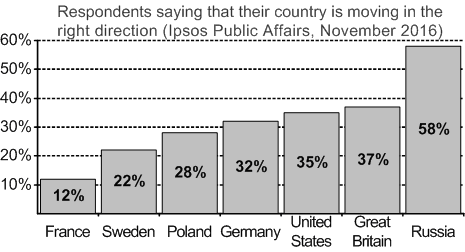
Evidently, Russians feel much better about the way
their nation is shaping up than do constituents of many western nations[6] whose sanctimonious leaders like to
lecture their Russian counterparts about prosperity, freedom, democracy and
other exalted values they purport to cherish.[7] It may thus only surprise the most
credulous consumers of western propaganda that a high proportion of Russian
people trust Vladimir Putin and approve his job performance. In the early 2017,
Putin’s job approval stood between 80% and 90% and has averaged 74% over the
eleven years from 2006. During this period, no western leader has come even
close to measuring up with Vladimir Putin.

Over the years, I’ve heard depressingly many
intellectuals attempt to dismiss Putin’s achievements and Russian people’s
contentment as the product of Russian government propaganda. Putin the
autocrat, you see, keeps such tight control over the media that he can deceive
his people into believing that things in the country are much better than they
really are. But the idea that government propaganda can influence public
opinion in this way is just silly. If the majority of people thought their
lives were miserable, state propaganda could not persuade them that everything
is great. On the contrary, most people would conclude that the media is
deceiving them and might feel even less positive about things as a result.[8] It is sillier still to think that
western intellectuals should have a better appreciation of what it is like to
live in Russia than the Russian people themselves. Rather than buying the truth
from their media, such intellectuals would do well to take a trip and visit
Russia, speak to ordinary people there, and reach their own conclusions. My own
travels in Russia, as well as reports from other visitors largely agree with
the positive picture that emerges from the statistics we’ve just examined.
No comments:
Post a Comment